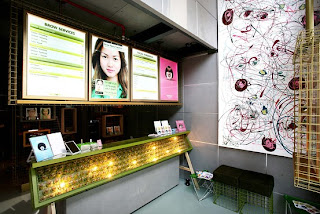At Browhaus, eyebrow specialists will shape your brows according to face-reading traits that traditionally represent good relationships and smooth career paths
Chinese Face Reading, Coming to a Spa Near You
In the world of Chinese superstition — that of astrology and zodiac signs — there’s also face reading, an ancient practice built on the belief that a person’s present and future is directly reflected in his face. It is widely performed in Hong Kong, where many of these fortune tellers hold court in temporary street stalls in the city’s dingier neighborhoods. It’s not the kind of service you’d expect to find in the glossy confines of Asia’s top spas and beauty shops.
Until now.
In early March, the Mandarin Oriental Hong Kong brought face reader Eric Standop — from Germany, not from Hong Kong’s Temple Street — to read people’s fortunes for a week. The price: 1,500 Hong Kong dollars (about US$190).
“The spa and wellness world has often found exotic cultures alluring and a treasure trove for new ideas,” says Cathy Chon, founder of life and style consultancy CatchOn in Hong Kong. There was a time, she adds, when Chinese medicine treatments such as acupuncture and cupping were viewed by many as hokey. These days, such services are common in spas, and celebrities such as Gwyneth Paltrow are fans.
Other spas around the region are touting some version of face-reading treatments. Come summer, the Karma Kandara resort spa in Bali will welcome Japan-born face reader Fumi Yamamoto. And at the day spa Browhaus in Shanghai, eyebrow specialists will shape your brows according to face-reading traits that traditionally represent good relationships and smooth career paths.
But in the spa translation of face reading, specialists also provide remedies to improve your face, and ostensibly your fortune. For instance, Ms. Yamamoto claims she can make your face look decades younger in a single treatment that goes for US$200, by performing a series of light tapping with her fingertips – “like acupuncture without the needles,” she says.
It sounds like hocus-pocus, but faithful client Sarah Kate Tammer, a make-up artist, says that post-treatment, she found “more contour on the cheekbones, eyes lifted, the texture of the skin is finer, no more dark circles or saggy jaws.”
At Browhaus Shanghai, the “face reading” is more about brow shaping. For example, two fingers’ width of separation between the eyebrows makes a person more open-minded, according to this belief, the area between your eye lids and brows should be free of loose hairs for a smooth career; and the tail end of your brows should be filled and not broken to ensure romance in your life.
“Not everyone believes in face fortune,” says Casper Fung, the marketing director for Browhaus Shanghai. “We don’t want to make this about fortune telling. It’s just something fun and sometimes it rings a bell with Chinese people, because face reading is part of our culture.”
Will spa-goers buy into face fortune? Or is this just another gimmick?
We decided to put two face readers to the test, one from a face reader in Hong Kong’s Temple Street district, and one from the city’s upscale Mandarin Oriental hotel. Would they say the same thing?
First stop: the Mandarin Oriental Hong Kong spa
Mr. Standop, who has studied face-fortune telling for 10 years, spent 90 minutes reading my face: It started with 10 minutes of sketching, another 10 minutes for Mr. Standop to gather his thoughts, and finally an hour-long discussion. This included a nutritional plan — “The visible vertical lines across your nails indicate some issues with metabolism,” said Mr. Standop — and some career-and-life counseling, too: “Your communication line is incomplete so it’s your life’s work to communicate more with the world,” he added. He recommended some possible career paths — journalism (!),entertainment and teaching — and suggested I cut down my intake of unhealthy foods.
Accurate? Yes, actually. Weeks later at my annual physical, my primary physician recently told me I had high cholesterol. But Mr. Standop’s “guess” about my career path was easy — he’d seen my business card, which says I’m a reporter. The reading wasn’t wrong, but it was anticlimactic.
Second stop: Temple Street
It’s Friday night in Hong Kong’s Kowloon district, and the face reader sitting across me, who says his name is Mr. Lau, starts almost immediately to describe my fortune. “A great year for money, a bad year for children,” he says. Then I’m given investment advice: “Never buy a factory in China.” I asked if I had any health issues, and was told I’d suffer a few bouts of the flu this season (I was sporting an obvious cough), but nothing serious. No mention of fingernails (Mr. Standop said they are a telltale sign of good — and bad — health) my high cholesterol or a nutrition plan. At the end, I asked him what career I should pursue. His answer: “Working with people,” which pretty much describes most jobs.
The bill for the 15-minute chat: HK$100, which I bargained down from HK$300 and had to pay upfront.


